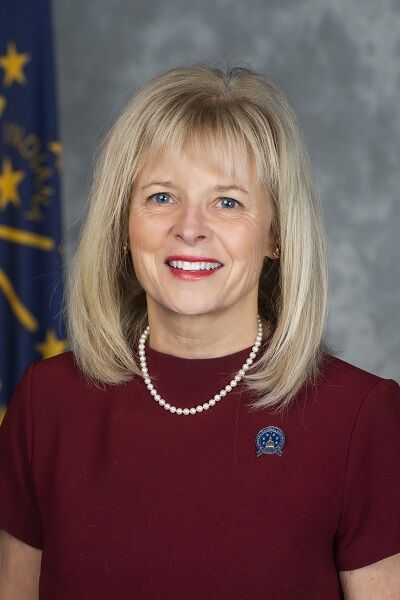The debate surrounding Indiana’s Senate Bill 143 has brought out many emotions, with advocates on each side painting starkly contrasting pictures of what its passage would mean for parental rights and governmental involvement in the state.
For some, like dad Matthew Cook, the bill represents a safeguard against what he sees as government overreach, particularly in the areas of children’s mental health and gender identity. On the other side, advocates such as student Katie Healy warn what the bill would mean for youths’ confidence in confidentiality and the barriers it would place between adolescents and professionals.

Sen. Liz Brown, R-Fort Wayne.
As the bill moves forward, it promises to bring more intense debate about the balance between parental rights and child protection.
SB 143 is a piece of legislation that supporters say safeguards a parents fundamental right to dictate the “upbringing, education, health care, and religious instruction” of their children. The bill is authored by Sen. Liz Brown, R-Fort Wayne, Sen. Scott Alexander, R-Muncie, and Sen. Brett Clark, R-Avon.
“Parents are frustrated, and rightfully so, when they have to play second fiddle to the government,” Sen. Liz Brown, R-Fort Wayne, told TheStatehouseFile.com. “Parents have a sacred role that must not be usurped by government.
“The parental rights bill gives Hoosier parents important protections and legal recourse should governmental entities try to interfere with their parental decisions. I’m encouraged by other states that have passed similar legislation, and it’s time we have a parental rights law in Indiana, too.”
According to ParentalRights.org, a nonprofit political action organization, 18 states have statutes that define and protect parental rights. But 32 states, 64% of the country, have parental rights protected by strict scrutiny in courts.
If the General Assembly passes this law, Indiana will become one of the many states that protects parental rights with the highest level of scrutiny.
In 2024, Trans Legislation Tracker, an independent research organization, followed seven bills it called “anti-trans” but only SB 202 passed, which impacts diversity, equity and inclusion initiatives. This year, it is tracking 15 bills, with SB 143 being one.
Cook, a father who testified in front of the House Judiciary Committee on Monday, explained his situation: “Like thousands of others, my family and I recently relocated here after fleeing Illinois, a state that has been in a downward spiral of governmental tyranny for decades.” He explained that his daughter was “victimized” by the state of Illinois and his rights as a parent were “stripped away” as she was going through mental-health treatment.
“I’m a layman, so I think I could put it into layman’s terms. ... If a child happens to find themselves in some kind of mental health counseling situation, the staff within that facility cannot persuade that child of God to change their gender,” Cook stated. “Indiana Senate Bill 143 is a testament to our state’s commitment to family values and the empowerment of parents in guarding their children's futures.”
On the opposing side, Katie Healy, a student at Purdue University studying to become a family nurse practitioner, voiced her concern with the bill.
“Adolescents are more likely to seek care and disclose critical health concerns when they feel safe,” she said. “SB 143 as written does not provide sufficient protection for these confidential conversations, which could lead to delayed intervention and worse health outcomes.”
Healy referenced the American Medical Association, which says that adolescents may need access to confidential care, particularly in areas such as mental health, substance abuse and reproductive health.
“While I fully support parental involvement and right to information, I believe this bill is too broad and could have unintended negative consequences on adolescent health and wellbeing,” Healy said. “Current laws already establish appropriate exceptions to confidentiality, such as in cases of abuse, imminent harm or communicable diseases. SB 143, however, eliminates essential discretion for health-care providers who must navigate complex and sensitive situations.”
Through SB 143, any action or policy that interferes with a parent's ability to make decisions regarding their child’s upbringing must meet the highest legal standard, strict scrutiny. Unless the government can prove that its interference with a certain parental right is a compelling governmental interest and the least restrictive way to advance that interest, then the government is prohibited from burdening these rights.
Adding to the conversation was Dr. Dan Stock, a doctor of functional family medicine and a focus of controversy during the COVID-19 pandemic. He stood in support of the bill but suggested two changes.
The first would make it so that if the state takes legal action against a parent and loses, it is obligatory that it pay the legal cost of the parent it went after. The second specifies that the government has no interest in any treatment of “gender dysphoria vaccination.”
According to factcheck.org, “gender dysphoria vaccination” is a claim that gender dysphoria can be caused by a vaccine, but there is no scientific evidence to back up this statement.
“The vaccine uptake of the nation is by itself an indication of just how little faith that the population has in the medical judgment of providers,” Dr. Dan Stock said. “These are two areas that are not well decided and should not be decided by a court of law or anyone in government.”
The executive director of the ACLU of Indiana, Chris Daley, spoke briefly in opposition of the bill, restating the organization’s point that although minors do not have the same constitutional rights as adults, they still have constitutional rights. The ACLU of Indiana also has problems with the broad applicability of the bill
Dawn Marie White, an attorney whose cases usually involve complex medical issues and mistaken abuse, drew from her experience representing Grant and Amanda Phillips in a high-profile case.
In a year-long case after the Phillips children were taken into DCS care after unexplained fractures that were deemed child abuse, the court found that the children were not in need of services, and they were diagnosed with a rare disease that caused the fractures.
“Throughout their case, there were several times that their rights were blatantly ignored, including an overt attempt by a governmental agency to preclude them from having access to their children’s medical information,” White said. “I estimate that I am arguing this specific issue of information being denied to parents at least on a monthly basis.
“The medical and psychological experts, colleagues and parents that I work with very much believe that child abuse occurs and should be stopped. But denying parents access to information about their children’s health and behaviors does not prevent, curtail or bring about a cessation of abuse or neglect.”
Founder and director of Hoosiers for Medical Liberty, an Indiana social welfare advocacy group, and a master's prepared registered nurse from Fort Wayne, Ashley Grogg, expressed her sympathy for the bill but stood in opposition of what it could mean for parental rights.
“Our parental rights are not secondary to compelling governmental interest. Period.”
“I talked with those who are proposing this bill and I find some flaws in their logic. First of all, they cannot provide me with a single case in which this legislation helped in the other 19 states that this was passed,” Grogg said. “Do we want to put something into legislation that hasn’t been shown to be effective and maybe even causing more problems for parents who are seeking to raise their kids in congruence with their beliefs?”
Grogg said the problem stems from the agencies, such as DCS, that are short staffed.
“How do you make good decisions when you are struggling to keep up? You can’t. Fix the root of the problem—this does not do that,” she said. “It would be very foolish to move forward with this because it does threaten our parental rights by saying, ‘As long as you can show there's a compelling governmental interest, it's OK.’”
Rep. Alex Burton, D-Evansville, one of just three representatives who voted nay on the bill, gave his input before the committee voted.
“From what I’m gathering, the past 20 years, everyone has said, ‘Oh, DCS is a nightmare and disaster,’ but instead of focusing on policy that fixes the agency, there's been a lot of bills, not just this one, that have just sought to fix issues that I think the agency is suited to fix,” Burton said. “I believe that everyone in the state that is hired by the state is capable, and we should allow them, with the new administration taking hold, we should let them take the lead on some of this.”
The committee passed the bill with the addition of amendment seven, which strikes the statement made in the bill that the government entity has the burden of proving that it did not violate the section. Members of the committee were concerned that proving something did not happen is counter to the way things are usually handled and could make the bill difficult to implement.
The bill passed through the House Judiciary Committee 9-3 and will next make its way to the House of Representatives.




(0) comments
Welcome to the discussion.
Log In
Keep it Clean. Please avoid obscene, vulgar, lewd, racist or sexually-oriented language.
PLEASE TURN OFF YOUR CAPS LOCK.
Don't Threaten. Threats of harming another person will not be tolerated.
Be Truthful. Don't knowingly lie about anyone or anything.
Be Nice. No racism, sexism or any sort of -ism that is degrading to another person.
Be Proactive. Use the 'Report' link on each comment to let us know of abusive posts.
Share with Us. We'd love to hear eyewitness accounts, the history behind an article.